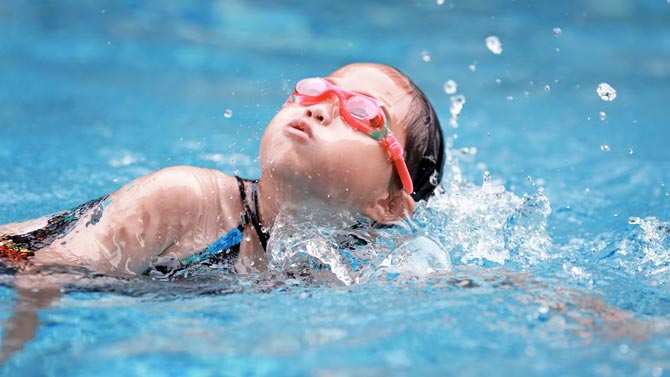From constant supervision to preventing drain entrapment, here are some of the most important safety tips for swimming with kids in. In South Florida there are so many types of waters that kids go swimming in, from well-regulated swimming pools to less predictable ocean waters. Pools are the best learning environment for young swimmers. Any pool that children swim in should be compliant with the Pool and Spa Safety Act.
Once kids master the basics of swimming in a pool they can move on to swimming in lakes and oceans. Of course, children should only go out in the ocean when waters are clam and there’s no danger for rip currents.
Our campers spend a lot of time out in the water and as a result safety is our number one priority.
7 Safety Tips For Swimming With Kids
#1. Supervise Kids At All Times When They Are In The Water
Every year in the US, around 3,563 people die from unintentional drownings—this number doesn’t include boating-accidents. That’s around 10 drowning incidents every single day. 1 in 5 people that die of drowning are children ages 14 and younger. For every child that passes away due to drowning, another 5 children are treated at an area hospital for complications involving submersion. Keep in mind that even nonfatal drowning incidents can lead to serious injury, including brain damage from lack of oxygen.
Constant supervision might seem tedious, or even unnecessary if kids are fairly proficient swimmers, but it could save a life. Furthermore, the supervising adult should be within arm’s distance of babies, toddlers or small children when they are in the water.
#2. Enroll Kids In Swimming Lessons
Swimming lessons save lives every single day. Even kids that know how to swim can drown but it’s far less likely to happen. Plus, swimming is an excellent form of exercise for kids as well as a fun social outlet, a win-win!
#3. Make A Splash About The Rules
Before kids learn how to swim it’s important to teach them the rules. Make sure they understand how serious pool rules are and that breaking these rules can result in someone getting really hurt, or even dying. Some important pool rules for kids include:
-No roughhousing in the pool, holding people under water, etc.
-Don’t go into the water unless an adult is watching you and you have permission to enter.
-Don’t test how long you can hold your breath underwater, this can lead to hypoxic blackout, and ultimately drowning.
-Don’t run around the edges of the pool as it’s very easy to slip and fall and get hurt.
#4. Teach Your Kids About Drain Entrapment
Hair can easily get tangled in drains or suction outlets, leading to drowning. Repeatedly inform kids of these dangers and remind them not to swim near drains or suction outlets. Wearing long hair in tight braids, buns, or in a swim cap provides additional protection.
If you have a pool or spa, install multiple drainage systems to decrease the power suction coming from each one. By reducing drainage power you ultimately reduce the risk of entrapment and death. If your pool or spa has a very strong drain system, consider installing anti-entrapment drain covers or a safety vacuum release that’ll automatically shut down if something becomes entrapped in the drain.
#5. Utilize The Buddy System
Teach your kids to never go out in the water alone and always rely on the buddy system.
Taking a friend along can help prevent a bad situation from turning deadly. Even when using the buddy system, children should always inform an adult where they are going and make sure an adult is supervising them when they are in the water.
#6. Learn CPR
Parents, kids, just about everyone benefits from learning CPR. Sure, the paramedics will be on their way in no time, but it still takes time for medical staff to arrive on the scene, enough time for brain damage or even death to occur without CPR. Someone on site should know CPR whenever kids are swimming.
#7. Never Use Foam Toys Or Floats As Safety Devices
Foam toys and blow up floats are great fun for kids but they should never under any circumstances be used as flotation or safety devices. They cannot replace a life jacket and do not prevent kids from drowning.

